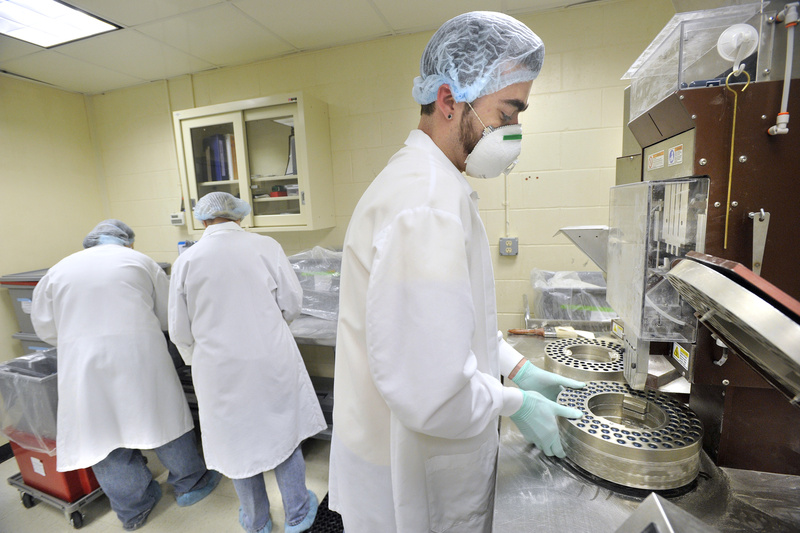The Portland City Council approved a 12-year tax break Monday to help finance an expansion of a local biotechnology firm without additional restrictions sought by Mayor Ethan Strimling.
Instead, the council voted unanimously to refer Strimling’s last-minute amendments regarding hiring practices and wages to the Economic Development Committee for further review. There is no deadline for the committee to report back to the council.
The council voted 8-1, with Strimling opposed, to approve the tax agreement, which provides $375,000 in local financing for ImmuCell, an animal health company focused on the dairy and beef industries, to expand its Riverside-area campus, adding an estimated 14 jobs.
ImmuCell estimates that its expansion will cost $17.5 million. Only $3 million of that is for a new 12,625-square-foot, two-story building, while $14.5 million is for equipment and furnishings.
Councilor and Economic Development Committee Chairman David Brenerman said the tax break was the only incentive the city could offer to keep the company in Maine. Most of its business is in the Midwest.
“To me, we should be celebrating the fact that ImmuCell wants to stay here and expand here,” Brenerman said.
Strimling opposed the agreement because he believes that so-called responsible contracting rules should be required when public money is being used. But he also didn’t think that ImmuCell truly needed the public funds to move forward with the project.
“This one just didn’t get there for me,” he said.
The tax break approved by the council is known as a TIF, for Tax Increment Financing. TIFs divert property taxes generated from new developments from the city’s General Fund to either help a developer pay debt associated with the development, or fund certain infrastructure projects by the city.
TIFs also shelter the property value of a new development from state revenue-sharing and education calculations, which tend to drop as a city’s value increases. In this case, the city would get $12,600 a year, or $150,000 in total, in so-called “sheltering” benefits, for the $375,000 it’s giving away in taxes, according to city documents. The city would receive $231,750 over the term of the TIF.
After the 12-year term, the entire value is added back onto the tax rolls.
Two members of the public spoke against the tax break.
West Street resident John Penrose was concerned that an independent analysis proving that ImmuCell needed the TIF was not made public. He described the tax break as “corporate welfare.”
West End resident and TIF critic Orlando Delogu said homeowners and small-business owners will end up paying more taxes as a result of the agreement.
“It’s an unconscionable course of conduct,” Delogu said.
Strimling made a last-minute attempt this month to set conditions on the agreement that would have imposed new rules for building contractors, prompting the council to postpone action on the agreement.
The new rules would have required that 25 percent of the work hours be performed by Portland residents and another 25 percent by ethnic minorities, women, veterans and disabled, economically disadvantaged or LGBT workers. They would also have required that all workers be paid wages and benefits which meet or exceed the Maine Department of Labor’s “prevailing wage” rates for their professions and that contractors participate in a state- or federally-approved apprenticeship program for all relevant trades.
Councilor Jon Hinck proposed a requirement that the project meet or exceed Portland’s environmental standards for energy-efficient “green” building construction. But that requirement was redundant with an existing ordinance, so he did not offer it Monday night.
Strimling’s proposals were backed by the Maine State Building and Construction Trades Council.
But councilors balked at the mayor’s proposals, which were not discussed prior to the Economic Development Committee’s unanimous recommendation in favor of the agreement.
Instead, the council passed an order directing the Economic Development Committee to consider adopting Strimling’s proposals in the city’s overall TIF policy.
In doing so, several councilors indicated they did not support the mayor’s proposed amendments to the ImmuCell agreement, or the way he introduced them at the last minute.
“In the last few years we’ve done a complete review of our TIF policy,” Councilor Nicholas Mavodones said. “It was a pretty robust review at the time.”
TIFs became the subject of debate in 2011 when the council voted to give Pierce Atwood, the city’s largest law firm, a $2.9 million tax break to convert a waterfront cold storage building into its offices. The tax break came after the firm threatened to leave the city.
The council tightened its TIF policy in 2013. After six months of study, the policy was tweaked to prioritize TIFs designed to finance improvements that have neighborhoodwide benefits – such as new sidewalks, lighting or traffic signals – and affordable housing. It also discouraged project-specific TIFs like ImmuCell’s, setting a 65 percent cap on the taxes that would be returned on these projects over a 20-year period.
Send questions/comments to the editors.



